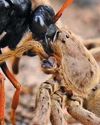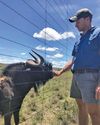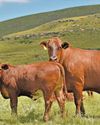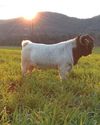Intentar ORO - Gratis
Crop Diversity A Pillar Of Sustainable Production
Farmer's Weekly
|August 9, 2019
Including more than three crops in a cash crop system may not only help increase yield, but significantly enhance the long-term sustainability of a farm. Dr Johann Strauss of the Western Cape Department of Agriculture spoke to Glenneis Kriel about the benefits of crop diversity.
-

Around the world, a growing number of farmers are switching to crop rotation due to its capacity to improve farm earnings through higher yield and reduced fertiliser, pesticide and herbicide usage, while boosting sustainability.
Long-term rotation trials by the Western Cape Department of Agriculture at the Langgewens Research Farm in the Swartland and Tygerhoek in the Southern Cape confirm this.
In crop rotation evaluations that started at Langgewens in 1996, wheat monoculture has always been the poorest performer of all the combinations under trial. But in rotations that included at least one type of legume, such as lupines or medics, the average wheat yield was 30% higher than when wheat was produced in a monoculture. The yields of rotations containing no legumes were on average 12% higher.
BEST ROTATION
A medic-canola-medic- wheat rotation consistently performed the best, producing an average yield 37% better than a system where wheat was produced on its own (see table).
Water- and nitrogen-use efficiency also improved. Wateruse efficiency of rotations that included canola was 11% higher, and rotations that included one or more years of legume crops or pastures were between 26% and 31,6% higher than when wheat was planted on its own.
Nitrogen-use efficiency was on average 89% better in rotations that included legumes than when wheat was produced alone, and 35% better when the rotation included only one year of legumes. The use of canola in the rotation, without any legumes, increased nitrogen-use efficiency by 9%.
During the past two seasons, of which 2017 was dry and 2018 had below-average rainfall, the researchers set out to establish how low the nitrogen level could be reduced in a medic and wheat rotation.
Esta historia es de la edición August 9, 2019 de Farmer's Weekly.
Suscríbete a Magzter GOLD para acceder a miles de historias premium seleccionadas y a más de 9000 revistas y periódicos.
¿Ya eres suscriptor? Iniciar sesión
MÁS HISTORIAS DE Farmer's Weekly

Farmer's Weekly
Pastry delights and cupcakes
The versatility of pastry in baking and cooking is best flaunted by two vastly different recipes appealing to the sweet and savoury tooth, while a novel way to bake those Christmas-themed cupcakes will also go down well.
4 mins
December 5-12, 2025

Farmer's Weekly
Specialised spider-hunting wasps
Wasps are apex predators of the insect world and have developed many survival strategies. One group of wasps focuses on hunting spiders to provide a source of food for their larval offspring
2 mins
December 5-12, 2025

Farmer's Weekly
From bulls to boardrooms: farming part-time as a professional
Maintaining a farm requires time, resources, and commitment. Farming part-time while being fully employed elsewhere can seem daunting and risky. Although it certainly presents unique challenges, it is feasible for some. Koot Klopper and Herman van Heerden spoke to Henning Naudé about how excellent time management and the delegation of resources, as part-time farmers, successfully keep their farms productive.
5 mins
December 5-12, 2025

Farmer's Weekly
Holy Shiitake: mastering the science of gourmet fungi
Mushroom production is inherently the practice of expanding mycelium. But since wanted and unwanted fungi flourish under the same circumstances, a mushroom farmer's biggest challenge is ensuring the right fungi prevails. Lindi Botha reports on Rory Brooks' learning curve.
9 mins
December 5-12, 2025
Farmer's Weekly
No more 'secret' price hikes?
'Secret' electricity price hikes in South Africa have been curbed in a game-changing court ruling, explains Felix Dube, lecturer in the Department of Law at the University of Venda.
4 mins
December 5-12, 2025

Farmer's Weekly
The cutworm scourge, and how to control it
The dominant cutworm, Agrotis segetum, is causing renewed, costly damage to South African maize, soya bean, and sunflower.
5 mins
December 5-12, 2025
Farmer's Weekly
Legislative gap requires a rethink on biosecurity controls
Since the dawn of democracy, the agriculture sector has cemented its place as one of the essential and trusted pillars for economic growth, job creation, and foreign earnings in South Africa.
2 mins
December 5-12, 2025

Farmer's Weekly
From kitchen experiments to a thriving meat empire
What started as an after-hours kitchen project in the Truter household has grown into the fully fledged meat empire Deli-Co. Brothers Pieter and Hendri Truter told Glenneis Kriel how they turned a local favourite into a multigenerational family business.
7 mins
December 5-12, 2025

Farmer's Weekly
Brushing up on your 'cow speak'
Experienced stockman and cattle judge Willie de Jager spoke to Sabrina Dean about some of the basics of reading cattle behaviour and how best to handle these animals.
8 mins
December 5-12, 2025

Farmer's Weekly
Corporate day job fuels farming dream
Marius Smit lives in the middle of Gauteng in Centurion and spends his workdays in the fast-paced high-stress corporate sector as a group forensic head for Discovery.
5 mins
December 5-12, 2025
Translate
Change font size
